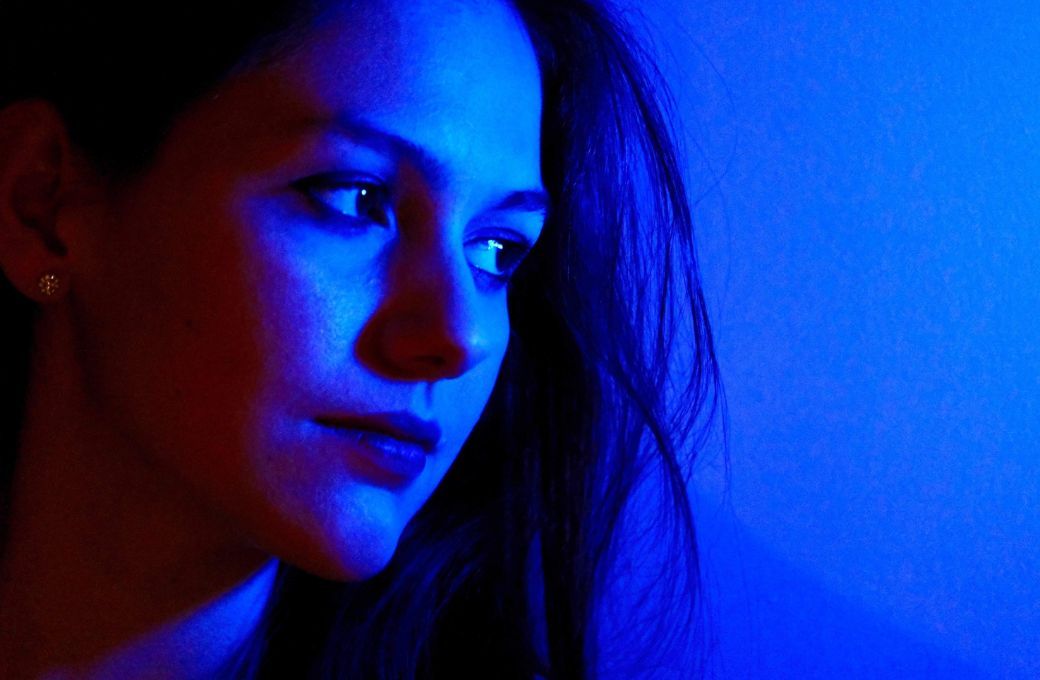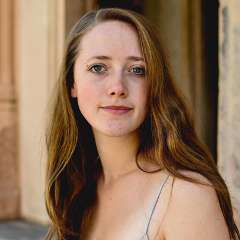Elise Bertrand has been writing music for twelve years, which is to say, very nearly half her life. She started playing the piano when she was just five years old, then progressed to the violin at age eight, and three years later began composing her first pieces on her own. Her career shows no signs of slowing down.

As a composer and as a performer, her career has gone from strength to strength: the Paris Conservatory, the Ozawa Academy (twice), a profile in Diapason magazine. Most recently, she was awarded the first prize of the Paris Rotary Club and became an artist in residence at the Queen Elisabeth Music Chapel. Her first album, Lettera Amorosa, was released last year. And this fall, she became the first composer to be nominated to the Classeek Ambassador Programme.
This sense of a multiple identity feels not only natural to Bertrand, but fertile. “I’ve always done these things in parallel, it’s a question of personal identity, not just artistic,” she tells me over video call. “I’ve found a balance between playing the violin, composition, commissions, my own work, concerts, competitions, etc.”
She knows her straddling of both worlds is unusual, but tempers that knowledge with historic context: “It was a lot more common in the nineteenth century, when you had conductors who were also pianists and composers. Nowadays it’s much less frequent, because of the hyper-specialisation that is characteristic of our time.”
She explains that her schedule fluctuates according to her commitments – a commission to finish, a concert to practice for – “it’s something mobile, dynamic”. She believes fully in this approach, as a way to connect wholly with the music she plays and to find inspiration and freedom when she writes. “It puts you in touch with a very concrete aspect of things. I know what it’s like to perform: I’m not a composer in an ivory tower, disconnected from the reality on stage. It allows me to be somewhere in between, both in terms of reality and on paper. I’m very lucky to have both.”
I ask about her approach to composition, and she shares her process for creating a new string quartet for the Quatuor Modigliani, a piece recently commissioned by the French quartet for their twentieth anniversary. After a phase of research, listening to recordings, reading through scores, she describes a hands-on approach to composition, trying out the various parts on the violin or piano, recording and combining them, in order to get a concrete sense of the piece. “The work of creation and interpretation is simultaneous, all the time. And that’s before entering into dialogue with the musicians, who bring their own extraordinary energy.”
As the performers start to work together, the score naturally evolves: in terms of tempo, for instance. “It’s not just my relationship to the piece that matters at this point: the piece becomes theirs.” As a performer, she’s familiar with this part of the process. “The first time you play through a contemporary piece, and the five or six times afterwards, you experience it completely differently. I find it fascinating.”
Evolution is something Elise Bertrand is coming to terms with in her own writing, too. “When you start to compose age eleven, you’re naturally reproducing things you’ve heard before, the music that is enshrined in each of us – I remember being very inspired by Debussy or Ravel, those impressionist worlds – and then, little by little, you start to discover your own possibilities, through the composers you encounter, through the new pieces that inspire and enrich your ear and your way of thinking, your spirit. Starting from there, you can start to create interior words, your own language, your own universe.”
This isn’t something that happens on its own. “The fact of studying composition as I was lucky enough to do – harmony, counterpoint, orchestration – opens up palettes of knowledge that allow you to ally concrete tools to your musical desires. When you have the richest possible palette of possibilities, you have free rein in terms of expression. Your sense of language naturally evolves depending on what you know, what you’ve studied, but also depending on who you meet, and the culture you grow up in.”
She details a mixed relationship with her French musical heritage: “You’re shaped by the culture you’re immersed in, of course – nothing comes from nothing – but I’m not necessarily looking to relate my work to one country or another, to have a stylistic anchoring.” In fact, she’s not looking to be defined by a particular style at all: “It depends on the pieces, it depends on the moment, I even wrote a modal piece called Les Traversées. 7: everything is possible. You just have to feel free.”
Among her mentors, she mentions Nicolas Bacri and Guillaume Connesson, with whom she studied in Paris. She is also supported by Eric Tanguy, one of the Classeek Ambassadors. “The musical language of Karol Szymanowski has always deeply moved me,” she says. “And there were a few great musical shocks in my life: Murail’s L’esprit des dunes, Berg’s Wozzeck – I’ve always found opera very moving, modern and contemporary opera in particular.”
But her influences extend beyond strictly musical inspiration. In composing Lui e Loro for the Quatuor Modigliani, she picked a historical angle to fit with their Italian theme: the Second World War battle of Monte Cassino. She describes the image that inspired the work: “After the bombings, after everything fell into ruins including inside the abbey, the only thing that was really left was a statue of Christ. A white statue, with its eyes raised to the sky. I found this message very touching, this symbol of resilience and hope. Even in the midst of war, something always endures. Life, absolute life takes over.” She believes that musical inspiration can be found anywhere: “It’s a question of having a poetic outlook on life, of observing everything around us carefully.”
Since this autumn, Elise Bertrand has been a young artist working with Swiss-based musical support network Classeek. She is the first composer to be accepted into their Ambassador Programme, providing one year of career support for up-and-coming artists. “When I learned I had been selected, it was a great honour and a great joy.”
Opportunities are already underway: a collaboration with Générations France Musique, a new trio commission, concerts in the pipeline. Elise has enjoyed meeting the other students enrolled in the programme, sharing her work with them, writing for them. The Swiss connection is a new one for her: despite having played in Gstaad and Rougemont, she admits to not knowing the country well. “Each country has its own microcosms, and networks in the music world still often function country by country. Being a part of Classeek’s programme opens doors and creates connections with people I wouldn’t have met otherwise.”
She describes the collaboration with Classeek as an evolving and promising one. “It’s just the beginning, the year has only just started, and it’s their first time working with a composer, so we’re spending a lot of time just talking and setting everything up together, thinking together about solutions, getting in touch with new contacts.” She sees the collaboration as a long-term project, and one she feels is off to a fruitful start.
“Being the first is a beautiful symbol. I feel very lucky. I know there were a lot of candidates, so I feel very supported by having been chosen. You always need support in your career, even if you’re starting to be recognised: as a creator, you’re always coming back to the blank page, you always have to face doubts. Being supported in this way is very important for the long term. It makes you feel like you’re making an impact.” It’s a reminder that no one is an island. “A composer needs performers. You can’t just write for yourself, in your bedroom, and then put it away in a drawer, that doesn’t work. You need that connection, that reciprocity.”
Bertrand is deeply invested in her future. I ask if she has any advice for young people who want to become composers. “Don’t hesitate to take the plunge,” she says. “You should study composition as seriously as possible, show the music you’re writing to competitions, and if you can, surround yourself with other musicians. I was lucky enough to have friends that believed in me when I was fifteen or sixteen, that played my music, and that was very important to me. Of course, there is the artistic side, you have to take that seriously, but making music comes from a human connection. If you are able to be open to others, to love others, to make connections, then beautiful things will happen.”
Applications for the Classeek Ambassador Programme 2024–25 are currently open until February 11th.
This article was sponsored by Classeek.


